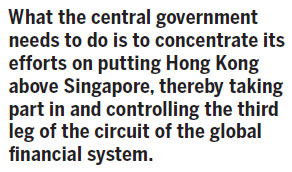Reinforce financial pre-eminence
Updated: 2013-06-28 08:02
By Thomas Chan(HK Edition)
|
|||||||

Together with Shanghai, Hong Kong was the overseas financial capital of the treaty port system and foreign concessions since the mid-19th century when the extra-territoriality regime was imposed on China. Even in the entire 20th century prior the return of Hong Kong to Chinese sovereignty in 1997, it had served first as the financial center of the British colonies and outposts in the "Far East", and when these colonies became independent but the Chinese mainland was overtaken by the Communist Revolution, the British colony continued to play its role of the regional financial center for the British and US interests, including the offshore center for Japan, South Korea and Taiwan and competed with Singapore in service to Southeast Asia's capital, and not just overseas Chinese capital there.
In other words, Hong Kong had been established as a free-trade port and regional financial center from the very beginning of its inception as a city economy and had fulfilled these objectives in the subsequent 150 years of its colonial era. It cooperated with Shanghai until 1949 as the twin city of the British overseas capital, and with the decline of Shanghai as the largest metropolis of Asia, Hong Kong had become the financial and service center of Asia until in recent times the rise of Singapore had made the city state Hong Kong's arch rival.
The 1997 return changed the fortune of Hong Kong as the region's financial center. Not only has Singapore taken the chance to aggressively compete with Hong Kong with overseas talents and corporations to develop the local offshore services. The change of sovereignty has brought anxiety to overseas investors and users of Hong Kong's financial services. For example, Japan had withdrawn the Hong Kong office of its central bank, and probably the anticipation of the regime change in its main offshore financial center had prompted the Japanese government to launch the Big Bang of its financial reform, which was proposed in November 1996 by the Hashimoto government.

However, after 1997 international transactions of Hong Kong have never resumed the 1995-96 level. Similarly, the importance of Hong Kong as the overseas financial center of East and Southeast Asia has steadily declined being replaced mostly by Singapore, whilst the contribution of mainland banks and transactions related to the mainland has grown. Hong Kong has become more and more a secondary stock exchange for shares of mainland corporations with the daily turnover of the Shanghai and Shenzhen exchanges overtaking Hong Kong by a large margin. Hong Kong has quickly turned inward and faced the challenge of being dwarfed by the huge domestic demand for financial services that prompted the meteoric rise of Shanghai and Shenzhen not only as national but also transnational financial centers of China.
Fortunately for Hong Kong, its holding of the third-largest global cluster of multinational professional corporation offices and practitioners still helps it to stand up against the challenges from Singapore and the now more internationalized Tokyo. According to the authoritative biannual surveys of the Global Financial Centres Index published by the City of London, Hong Kong has maintained its top position as the third global financial center of the world, since the surveys began in 2007, up to the most recent one in March this year. Singapore has surpassed Hong Kong only for 7 months from September 2008 to March 2009, but it remains the closest contender to Hong Kong's global position and the difference between the two has narrowed to an insignificance of 2 points behind the score of 761 of Hong Kong. On the contrary, Shanghai had once posed a threat to both Hong Kong and Singapore in 2010 and 2011, when it ranked 5th in the world. It has fallen back to the 24th position in March 2013 just as it was in March 2007 with an enlarging gap of scores.
Despite all the recent bad news about the decline in competitiveness of Hong Kong, it remains as the only candidate of mainland cities to become the third leg of the 24-hour financial circuit of the global system after London and New York. London has successfully fended off the challenge from Frankfurt. What the central government needs to do is to concentrate its efforts on putting Hong Kong above Singapore, thereby taking part in and controlling the third leg of the circuit of the global financial system. This should be a much more important and immediate benefit to China than the internationalization of the renminbi, which will take years, if not decades, to achieve.
The author is head of China Business Center, Hong Kong Polytechnic University.
(HK Edition 06/28/2013 page9)